The Madoff Scandal: An Analysis of Ethics, Fraud, and Auditing Roles
VerifiedAdded on 2023/04/11
|7
|2088
|385
Essay
AI Summary
This essay delves into the unethical practices behind Bernie Madoff's Ponzi scheme, examining the factors that influenced such conduct and how ethical decision-making could have been applied to prevent the fraud. It explores the rights and responsibilities lens, results lens, and relationship lens in the context of Madoff's actions, highlighting the lack of character, virtue, and integrity displayed. The essay further emphasizes the crucial role of auditors in detecting and preventing fraud, suggesting that a more thorough and independent audit could have uncovered Madoff's scheme earlier. Ultimately, the analysis concludes that engaging in unethical business behaviors leads to more harm than good, and that a combination of ethical awareness, strong internal controls, and incorruptible auditing practices are essential for preventing Ponzi schemes.
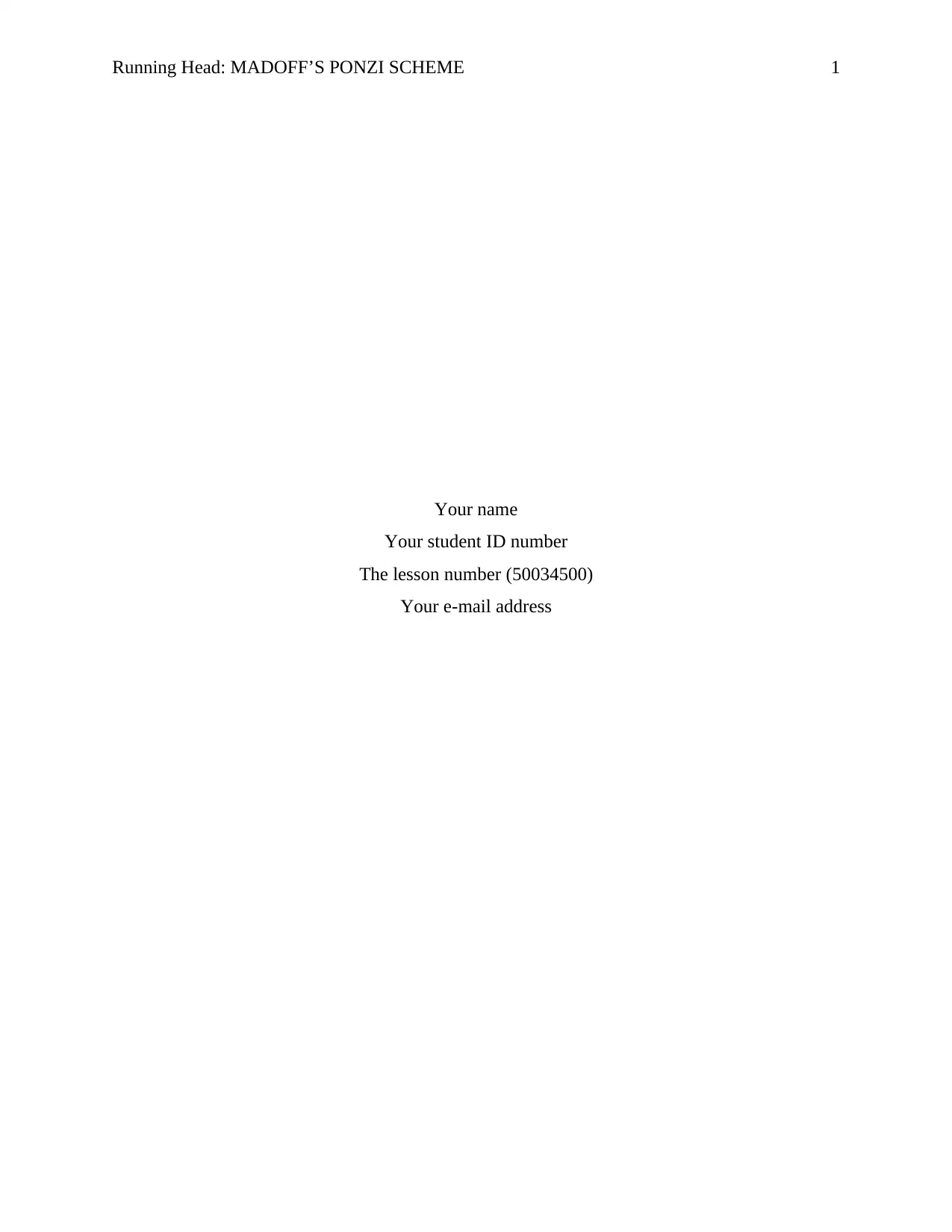
Running Head: MADOFF’S PONZI SCHEME 1
Your name
Your student ID number
The lesson number (50034500)
Your e-mail address
Your name
Your student ID number
The lesson number (50034500)
Your e-mail address
Paraphrase This Document
Need a fresh take? Get an instant paraphrase of this document with our AI Paraphraser
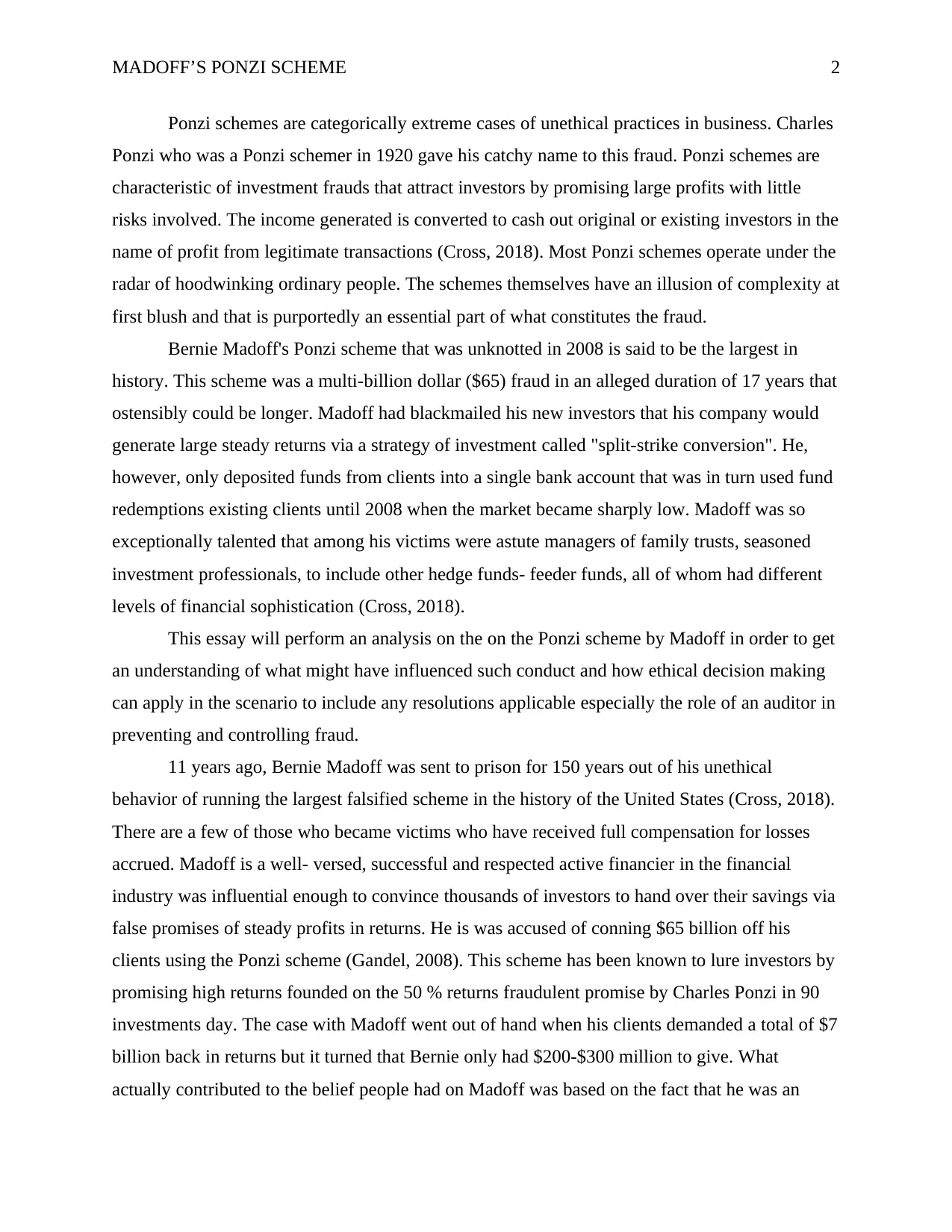
MADOFF’S PONZI SCHEME 2
Ponzi schemes are categorically extreme cases of unethical practices in business. Charles
Ponzi who was a Ponzi schemer in 1920 gave his catchy name to this fraud. Ponzi schemes are
characteristic of investment frauds that attract investors by promising large profits with little
risks involved. The income generated is converted to cash out original or existing investors in the
name of profit from legitimate transactions (Cross, 2018). Most Ponzi schemes operate under the
radar of hoodwinking ordinary people. The schemes themselves have an illusion of complexity at
first blush and that is purportedly an essential part of what constitutes the fraud.
Bernie Madoff's Ponzi scheme that was unknotted in 2008 is said to be the largest in
history. This scheme was a multi-billion dollar ($65) fraud in an alleged duration of 17 years that
ostensibly could be longer. Madoff had blackmailed his new investors that his company would
generate large steady returns via a strategy of investment called "split-strike conversion". He,
however, only deposited funds from clients into a single bank account that was in turn used fund
redemptions existing clients until 2008 when the market became sharply low. Madoff was so
exceptionally talented that among his victims were astute managers of family trusts, seasoned
investment professionals, to include other hedge funds- feeder funds, all of whom had different
levels of financial sophistication (Cross, 2018).
This essay will perform an analysis on the on the Ponzi scheme by Madoff in order to get
an understanding of what might have influenced such conduct and how ethical decision making
can apply in the scenario to include any resolutions applicable especially the role of an auditor in
preventing and controlling fraud.
11 years ago, Bernie Madoff was sent to prison for 150 years out of his unethical
behavior of running the largest falsified scheme in the history of the United States (Cross, 2018).
There are a few of those who became victims who have received full compensation for losses
accrued. Madoff is a well- versed, successful and respected active financier in the financial
industry was influential enough to convince thousands of investors to hand over their savings via
false promises of steady profits in returns. He is was accused of conning $65 billion off his
clients using the Ponzi scheme (Gandel, 2008). This scheme has been known to lure investors by
promising high returns founded on the 50 % returns fraudulent promise by Charles Ponzi in 90
investments day. The case with Madoff went out of hand when his clients demanded a total of $7
billion back in returns but it turned that Bernie only had $200-$300 million to give. What
actually contributed to the belief people had on Madoff was based on the fact that he was an
Ponzi schemes are categorically extreme cases of unethical practices in business. Charles
Ponzi who was a Ponzi schemer in 1920 gave his catchy name to this fraud. Ponzi schemes are
characteristic of investment frauds that attract investors by promising large profits with little
risks involved. The income generated is converted to cash out original or existing investors in the
name of profit from legitimate transactions (Cross, 2018). Most Ponzi schemes operate under the
radar of hoodwinking ordinary people. The schemes themselves have an illusion of complexity at
first blush and that is purportedly an essential part of what constitutes the fraud.
Bernie Madoff's Ponzi scheme that was unknotted in 2008 is said to be the largest in
history. This scheme was a multi-billion dollar ($65) fraud in an alleged duration of 17 years that
ostensibly could be longer. Madoff had blackmailed his new investors that his company would
generate large steady returns via a strategy of investment called "split-strike conversion". He,
however, only deposited funds from clients into a single bank account that was in turn used fund
redemptions existing clients until 2008 when the market became sharply low. Madoff was so
exceptionally talented that among his victims were astute managers of family trusts, seasoned
investment professionals, to include other hedge funds- feeder funds, all of whom had different
levels of financial sophistication (Cross, 2018).
This essay will perform an analysis on the on the Ponzi scheme by Madoff in order to get
an understanding of what might have influenced such conduct and how ethical decision making
can apply in the scenario to include any resolutions applicable especially the role of an auditor in
preventing and controlling fraud.
11 years ago, Bernie Madoff was sent to prison for 150 years out of his unethical
behavior of running the largest falsified scheme in the history of the United States (Cross, 2018).
There are a few of those who became victims who have received full compensation for losses
accrued. Madoff is a well- versed, successful and respected active financier in the financial
industry was influential enough to convince thousands of investors to hand over their savings via
false promises of steady profits in returns. He is was accused of conning $65 billion off his
clients using the Ponzi scheme (Gandel, 2008). This scheme has been known to lure investors by
promising high returns founded on the 50 % returns fraudulent promise by Charles Ponzi in 90
investments day. The case with Madoff went out of hand when his clients demanded a total of $7
billion back in returns but it turned that Bernie only had $200-$300 million to give. What
actually contributed to the belief people had on Madoff was based on the fact that he was an
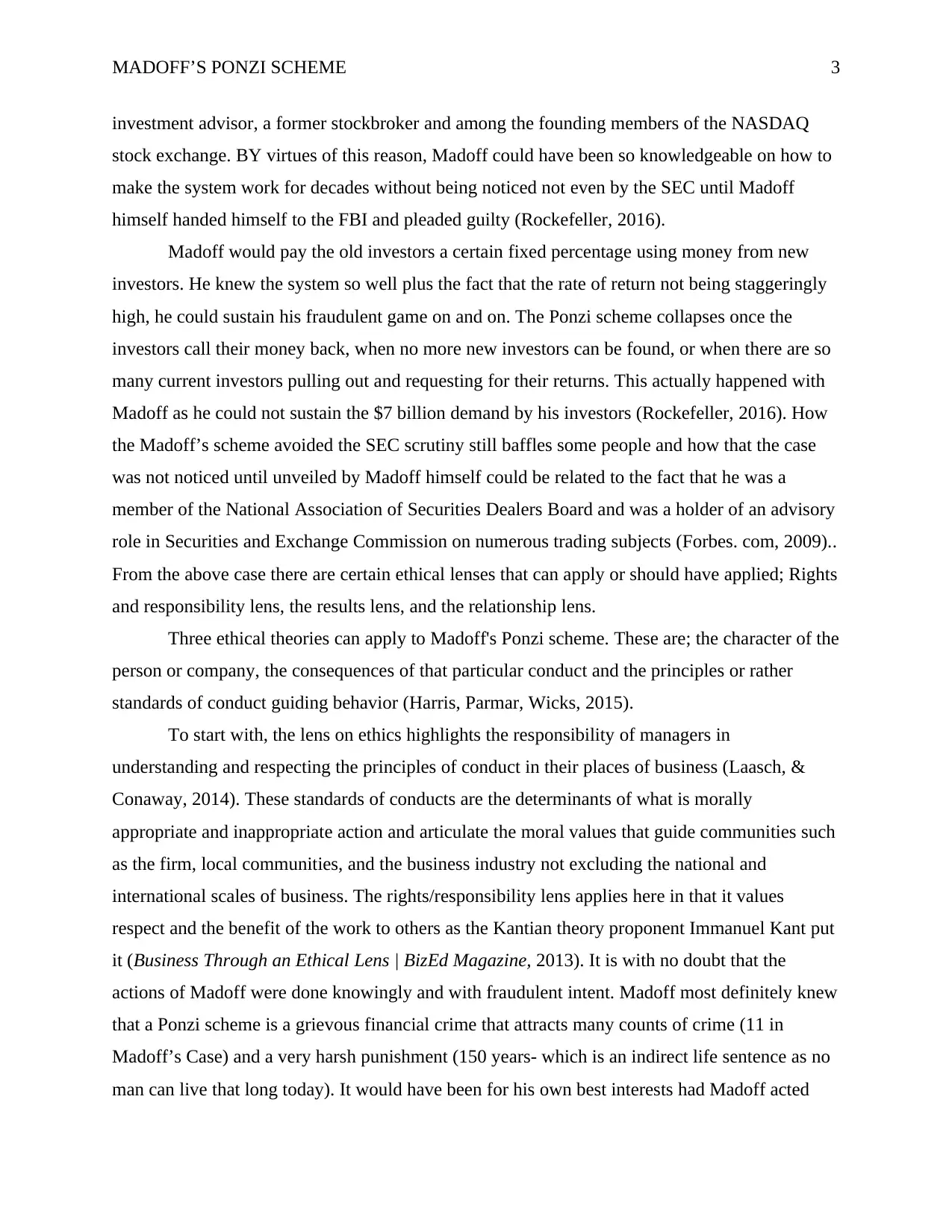
MADOFF’S PONZI SCHEME 3
investment advisor, a former stockbroker and among the founding members of the NASDAQ
stock exchange. BY virtues of this reason, Madoff could have been so knowledgeable on how to
make the system work for decades without being noticed not even by the SEC until Madoff
himself handed himself to the FBI and pleaded guilty (Rockefeller, 2016).
Madoff would pay the old investors a certain fixed percentage using money from new
investors. He knew the system so well plus the fact that the rate of return not being staggeringly
high, he could sustain his fraudulent game on and on. The Ponzi scheme collapses once the
investors call their money back, when no more new investors can be found, or when there are so
many current investors pulling out and requesting for their returns. This actually happened with
Madoff as he could not sustain the $7 billion demand by his investors (Rockefeller, 2016). How
the Madoff’s scheme avoided the SEC scrutiny still baffles some people and how that the case
was not noticed until unveiled by Madoff himself could be related to the fact that he was a
member of the National Association of Securities Dealers Board and was a holder of an advisory
role in Securities and Exchange Commission on numerous trading subjects (Forbes. com, 2009)..
From the above case there are certain ethical lenses that can apply or should have applied; Rights
and responsibility lens, the results lens, and the relationship lens.
Three ethical theories can apply to Madoff's Ponzi scheme. These are; the character of the
person or company, the consequences of that particular conduct and the principles or rather
standards of conduct guiding behavior (Harris, Parmar, Wicks, 2015).
To start with, the lens on ethics highlights the responsibility of managers in
understanding and respecting the principles of conduct in their places of business (Laasch, &
Conaway, 2014). These standards of conducts are the determinants of what is morally
appropriate and inappropriate action and articulate the moral values that guide communities such
as the firm, local communities, and the business industry not excluding the national and
international scales of business. The rights/responsibility lens applies here in that it values
respect and the benefit of the work to others as the Kantian theory proponent Immanuel Kant put
it (Business Through an Ethical Lens | BizEd Magazine, 2013). It is with no doubt that the
actions of Madoff were done knowingly and with fraudulent intent. Madoff most definitely knew
that a Ponzi scheme is a grievous financial crime that attracts many counts of crime (11 in
Madoff’s Case) and a very harsh punishment (150 years- which is an indirect life sentence as no
man can live that long today). It would have been for his own best interests had Madoff acted
investment advisor, a former stockbroker and among the founding members of the NASDAQ
stock exchange. BY virtues of this reason, Madoff could have been so knowledgeable on how to
make the system work for decades without being noticed not even by the SEC until Madoff
himself handed himself to the FBI and pleaded guilty (Rockefeller, 2016).
Madoff would pay the old investors a certain fixed percentage using money from new
investors. He knew the system so well plus the fact that the rate of return not being staggeringly
high, he could sustain his fraudulent game on and on. The Ponzi scheme collapses once the
investors call their money back, when no more new investors can be found, or when there are so
many current investors pulling out and requesting for their returns. This actually happened with
Madoff as he could not sustain the $7 billion demand by his investors (Rockefeller, 2016). How
the Madoff’s scheme avoided the SEC scrutiny still baffles some people and how that the case
was not noticed until unveiled by Madoff himself could be related to the fact that he was a
member of the National Association of Securities Dealers Board and was a holder of an advisory
role in Securities and Exchange Commission on numerous trading subjects (Forbes. com, 2009)..
From the above case there are certain ethical lenses that can apply or should have applied; Rights
and responsibility lens, the results lens, and the relationship lens.
Three ethical theories can apply to Madoff's Ponzi scheme. These are; the character of the
person or company, the consequences of that particular conduct and the principles or rather
standards of conduct guiding behavior (Harris, Parmar, Wicks, 2015).
To start with, the lens on ethics highlights the responsibility of managers in
understanding and respecting the principles of conduct in their places of business (Laasch, &
Conaway, 2014). These standards of conducts are the determinants of what is morally
appropriate and inappropriate action and articulate the moral values that guide communities such
as the firm, local communities, and the business industry not excluding the national and
international scales of business. The rights/responsibility lens applies here in that it values
respect and the benefit of the work to others as the Kantian theory proponent Immanuel Kant put
it (Business Through an Ethical Lens | BizEd Magazine, 2013). It is with no doubt that the
actions of Madoff were done knowingly and with fraudulent intent. Madoff most definitely knew
that a Ponzi scheme is a grievous financial crime that attracts many counts of crime (11 in
Madoff’s Case) and a very harsh punishment (150 years- which is an indirect life sentence as no
man can live that long today). It would have been for his own best interests had Madoff acted
⊘ This is a preview!⊘
Do you want full access?
Subscribe today to unlock all pages.

Trusted by 1+ million students worldwide
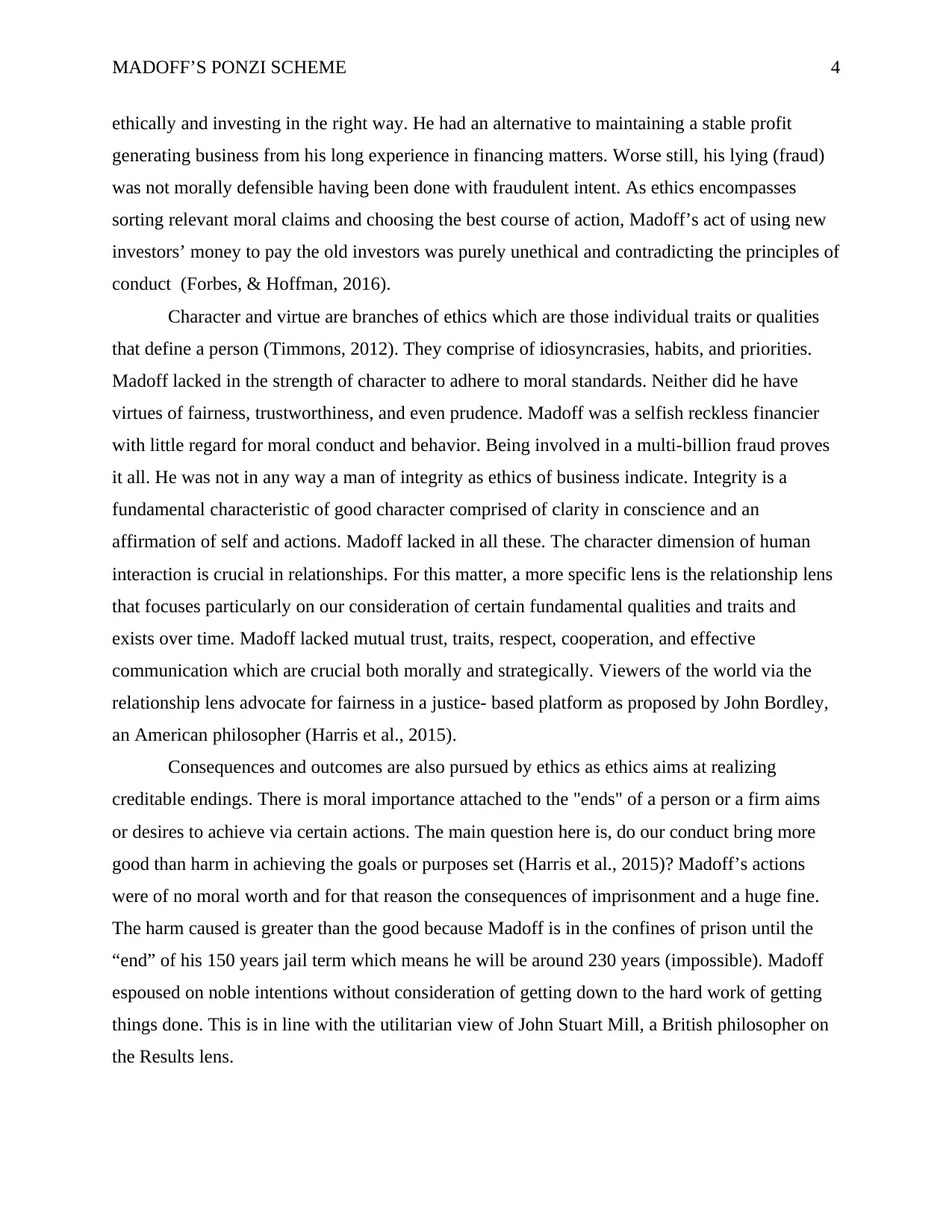
MADOFF’S PONZI SCHEME 4
ethically and investing in the right way. He had an alternative to maintaining a stable profit
generating business from his long experience in financing matters. Worse still, his lying (fraud)
was not morally defensible having been done with fraudulent intent. As ethics encompasses
sorting relevant moral claims and choosing the best course of action, Madoff’s act of using new
investors’ money to pay the old investors was purely unethical and contradicting the principles of
conduct (Forbes, & Hoffman, 2016).
Character and virtue are branches of ethics which are those individual traits or qualities
that define a person (Timmons, 2012). They comprise of idiosyncrasies, habits, and priorities.
Madoff lacked in the strength of character to adhere to moral standards. Neither did he have
virtues of fairness, trustworthiness, and even prudence. Madoff was a selfish reckless financier
with little regard for moral conduct and behavior. Being involved in a multi-billion fraud proves
it all. He was not in any way a man of integrity as ethics of business indicate. Integrity is a
fundamental characteristic of good character comprised of clarity in conscience and an
affirmation of self and actions. Madoff lacked in all these. The character dimension of human
interaction is crucial in relationships. For this matter, a more specific lens is the relationship lens
that focuses particularly on our consideration of certain fundamental qualities and traits and
exists over time. Madoff lacked mutual trust, traits, respect, cooperation, and effective
communication which are crucial both morally and strategically. Viewers of the world via the
relationship lens advocate for fairness in a justice- based platform as proposed by John Bordley,
an American philosopher (Harris et al., 2015).
Consequences and outcomes are also pursued by ethics as ethics aims at realizing
creditable endings. There is moral importance attached to the "ends" of a person or a firm aims
or desires to achieve via certain actions. The main question here is, do our conduct bring more
good than harm in achieving the goals or purposes set (Harris et al., 2015)? Madoff’s actions
were of no moral worth and for that reason the consequences of imprisonment and a huge fine.
The harm caused is greater than the good because Madoff is in the confines of prison until the
“end” of his 150 years jail term which means he will be around 230 years (impossible). Madoff
espoused on noble intentions without consideration of getting down to the hard work of getting
things done. This is in line with the utilitarian view of John Stuart Mill, a British philosopher on
the Results lens.
ethically and investing in the right way. He had an alternative to maintaining a stable profit
generating business from his long experience in financing matters. Worse still, his lying (fraud)
was not morally defensible having been done with fraudulent intent. As ethics encompasses
sorting relevant moral claims and choosing the best course of action, Madoff’s act of using new
investors’ money to pay the old investors was purely unethical and contradicting the principles of
conduct (Forbes, & Hoffman, 2016).
Character and virtue are branches of ethics which are those individual traits or qualities
that define a person (Timmons, 2012). They comprise of idiosyncrasies, habits, and priorities.
Madoff lacked in the strength of character to adhere to moral standards. Neither did he have
virtues of fairness, trustworthiness, and even prudence. Madoff was a selfish reckless financier
with little regard for moral conduct and behavior. Being involved in a multi-billion fraud proves
it all. He was not in any way a man of integrity as ethics of business indicate. Integrity is a
fundamental characteristic of good character comprised of clarity in conscience and an
affirmation of self and actions. Madoff lacked in all these. The character dimension of human
interaction is crucial in relationships. For this matter, a more specific lens is the relationship lens
that focuses particularly on our consideration of certain fundamental qualities and traits and
exists over time. Madoff lacked mutual trust, traits, respect, cooperation, and effective
communication which are crucial both morally and strategically. Viewers of the world via the
relationship lens advocate for fairness in a justice- based platform as proposed by John Bordley,
an American philosopher (Harris et al., 2015).
Consequences and outcomes are also pursued by ethics as ethics aims at realizing
creditable endings. There is moral importance attached to the "ends" of a person or a firm aims
or desires to achieve via certain actions. The main question here is, do our conduct bring more
good than harm in achieving the goals or purposes set (Harris et al., 2015)? Madoff’s actions
were of no moral worth and for that reason the consequences of imprisonment and a huge fine.
The harm caused is greater than the good because Madoff is in the confines of prison until the
“end” of his 150 years jail term which means he will be around 230 years (impossible). Madoff
espoused on noble intentions without consideration of getting down to the hard work of getting
things done. This is in line with the utilitarian view of John Stuart Mill, a British philosopher on
the Results lens.
Paraphrase This Document
Need a fresh take? Get an instant paraphrase of this document with our AI Paraphraser
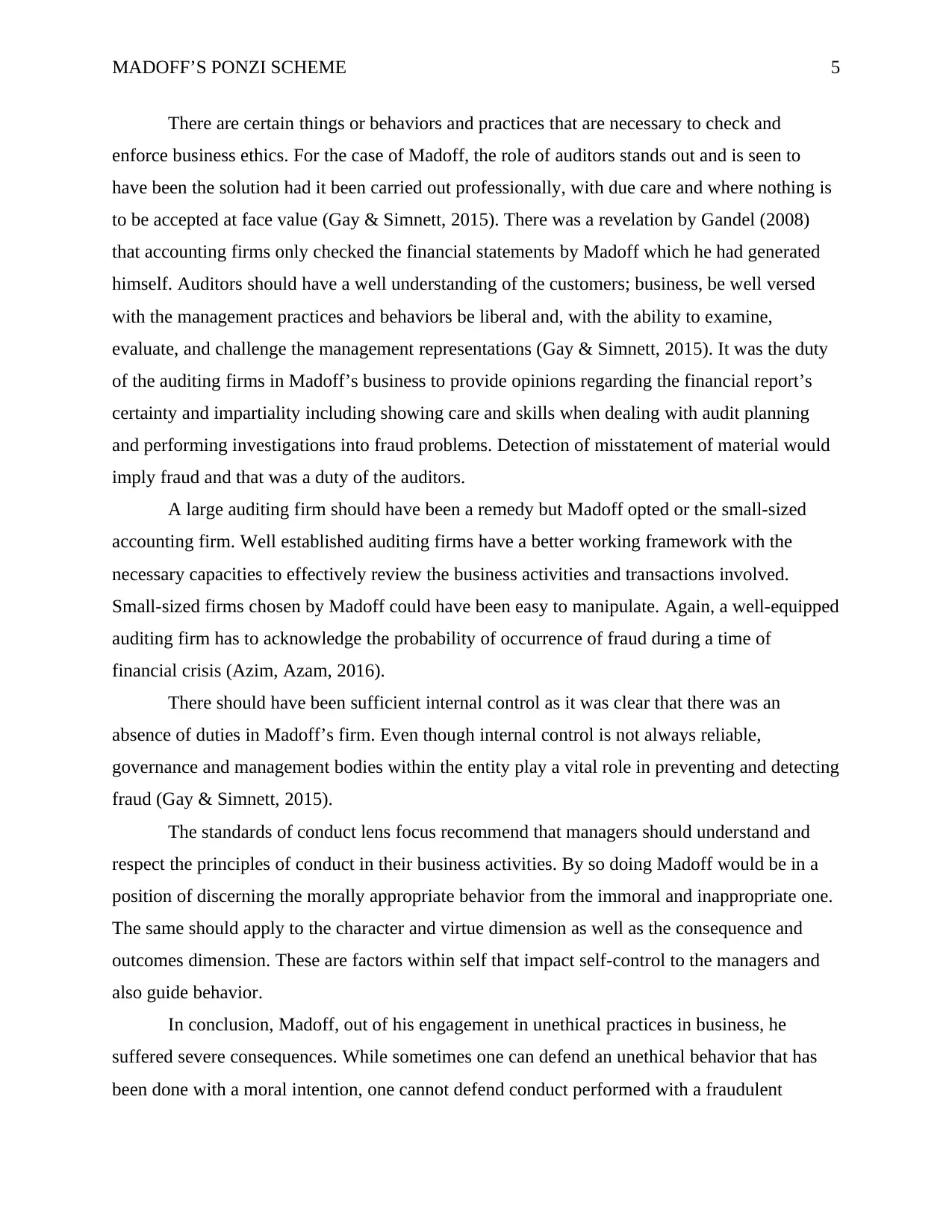
MADOFF’S PONZI SCHEME 5
There are certain things or behaviors and practices that are necessary to check and
enforce business ethics. For the case of Madoff, the role of auditors stands out and is seen to
have been the solution had it been carried out professionally, with due care and where nothing is
to be accepted at face value (Gay & Simnett, 2015). There was a revelation by Gandel (2008)
that accounting firms only checked the financial statements by Madoff which he had generated
himself. Auditors should have a well understanding of the customers; business, be well versed
with the management practices and behaviors be liberal and, with the ability to examine,
evaluate, and challenge the management representations (Gay & Simnett, 2015). It was the duty
of the auditing firms in Madoff’s business to provide opinions regarding the financial report’s
certainty and impartiality including showing care and skills when dealing with audit planning
and performing investigations into fraud problems. Detection of misstatement of material would
imply fraud and that was a duty of the auditors.
A large auditing firm should have been a remedy but Madoff opted or the small-sized
accounting firm. Well established auditing firms have a better working framework with the
necessary capacities to effectively review the business activities and transactions involved.
Small-sized firms chosen by Madoff could have been easy to manipulate. Again, a well-equipped
auditing firm has to acknowledge the probability of occurrence of fraud during a time of
financial crisis (Azim, Azam, 2016).
There should have been sufficient internal control as it was clear that there was an
absence of duties in Madoff’s firm. Even though internal control is not always reliable,
governance and management bodies within the entity play a vital role in preventing and detecting
fraud (Gay & Simnett, 2015).
The standards of conduct lens focus recommend that managers should understand and
respect the principles of conduct in their business activities. By so doing Madoff would be in a
position of discerning the morally appropriate behavior from the immoral and inappropriate one.
The same should apply to the character and virtue dimension as well as the consequence and
outcomes dimension. These are factors within self that impact self-control to the managers and
also guide behavior.
In conclusion, Madoff, out of his engagement in unethical practices in business, he
suffered severe consequences. While sometimes one can defend an unethical behavior that has
been done with a moral intention, one cannot defend conduct performed with a fraudulent
There are certain things or behaviors and practices that are necessary to check and
enforce business ethics. For the case of Madoff, the role of auditors stands out and is seen to
have been the solution had it been carried out professionally, with due care and where nothing is
to be accepted at face value (Gay & Simnett, 2015). There was a revelation by Gandel (2008)
that accounting firms only checked the financial statements by Madoff which he had generated
himself. Auditors should have a well understanding of the customers; business, be well versed
with the management practices and behaviors be liberal and, with the ability to examine,
evaluate, and challenge the management representations (Gay & Simnett, 2015). It was the duty
of the auditing firms in Madoff’s business to provide opinions regarding the financial report’s
certainty and impartiality including showing care and skills when dealing with audit planning
and performing investigations into fraud problems. Detection of misstatement of material would
imply fraud and that was a duty of the auditors.
A large auditing firm should have been a remedy but Madoff opted or the small-sized
accounting firm. Well established auditing firms have a better working framework with the
necessary capacities to effectively review the business activities and transactions involved.
Small-sized firms chosen by Madoff could have been easy to manipulate. Again, a well-equipped
auditing firm has to acknowledge the probability of occurrence of fraud during a time of
financial crisis (Azim, Azam, 2016).
There should have been sufficient internal control as it was clear that there was an
absence of duties in Madoff’s firm. Even though internal control is not always reliable,
governance and management bodies within the entity play a vital role in preventing and detecting
fraud (Gay & Simnett, 2015).
The standards of conduct lens focus recommend that managers should understand and
respect the principles of conduct in their business activities. By so doing Madoff would be in a
position of discerning the morally appropriate behavior from the immoral and inappropriate one.
The same should apply to the character and virtue dimension as well as the consequence and
outcomes dimension. These are factors within self that impact self-control to the managers and
also guide behavior.
In conclusion, Madoff, out of his engagement in unethical practices in business, he
suffered severe consequences. While sometimes one can defend an unethical behavior that has
been done with a moral intention, one cannot defend conduct performed with a fraudulent
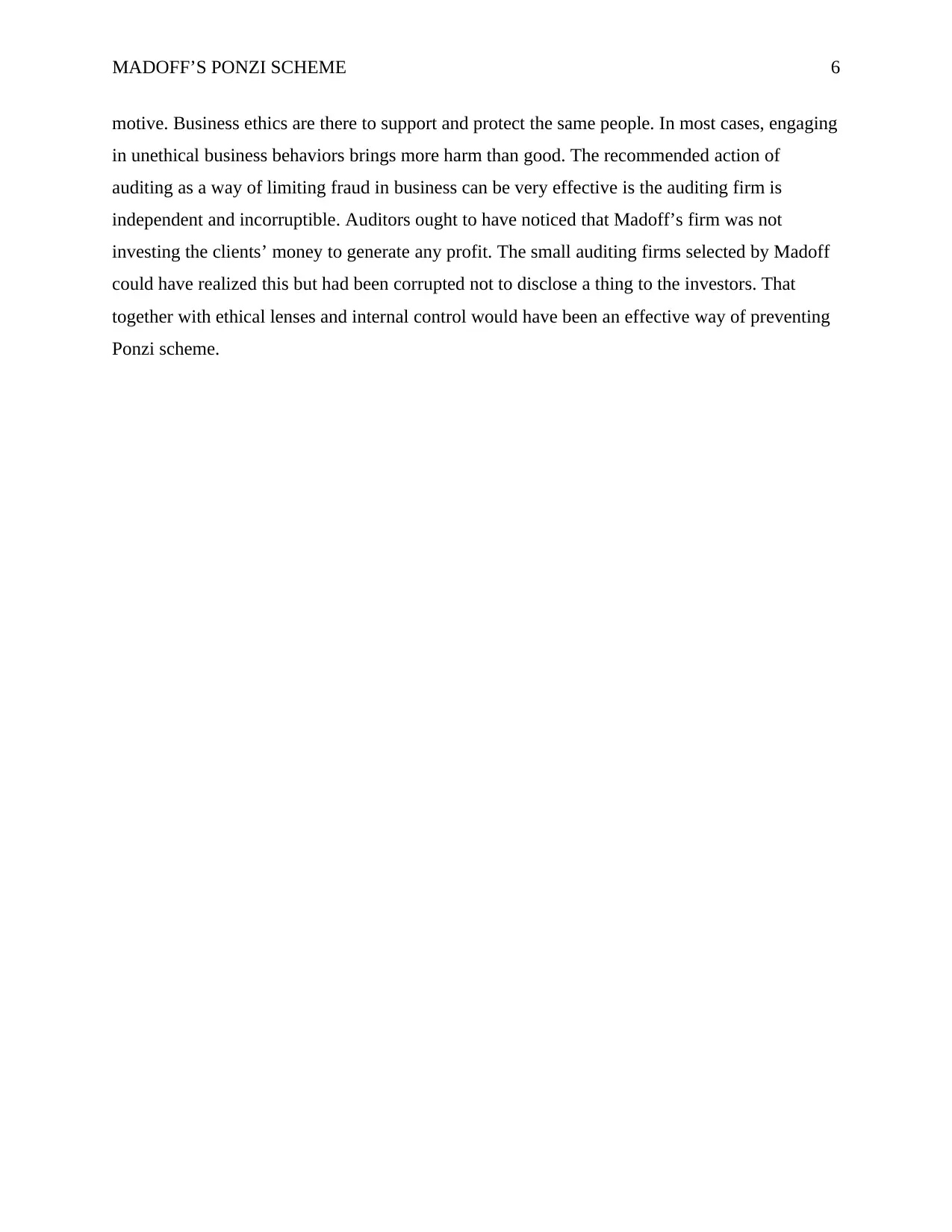
MADOFF’S PONZI SCHEME 6
motive. Business ethics are there to support and protect the same people. In most cases, engaging
in unethical business behaviors brings more harm than good. The recommended action of
auditing as a way of limiting fraud in business can be very effective is the auditing firm is
independent and incorruptible. Auditors ought to have noticed that Madoff’s firm was not
investing the clients’ money to generate any profit. The small auditing firms selected by Madoff
could have realized this but had been corrupted not to disclose a thing to the investors. That
together with ethical lenses and internal control would have been an effective way of preventing
Ponzi scheme.
motive. Business ethics are there to support and protect the same people. In most cases, engaging
in unethical business behaviors brings more harm than good. The recommended action of
auditing as a way of limiting fraud in business can be very effective is the auditing firm is
independent and incorruptible. Auditors ought to have noticed that Madoff’s firm was not
investing the clients’ money to generate any profit. The small auditing firms selected by Madoff
could have realized this but had been corrupted not to disclose a thing to the investors. That
together with ethical lenses and internal control would have been an effective way of preventing
Ponzi scheme.
⊘ This is a preview!⊘
Do you want full access?
Subscribe today to unlock all pages.

Trusted by 1+ million students worldwide
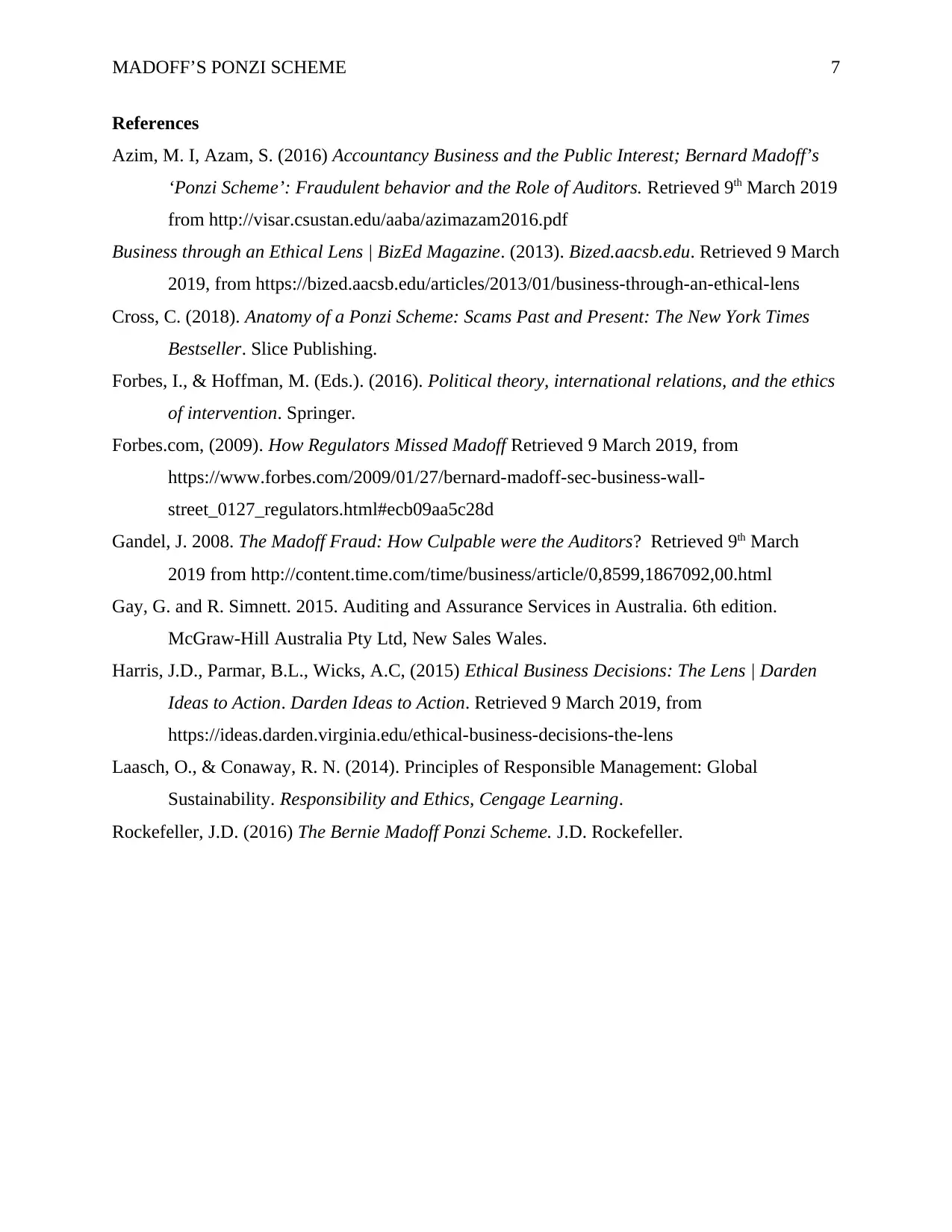
MADOFF’S PONZI SCHEME 7
References
Azim, M. I, Azam, S. (2016) Accountancy Business and the Public Interest; Bernard Madoff’s
‘Ponzi Scheme’: Fraudulent behavior and the Role of Auditors. Retrieved 9th March 2019
from http://visar.csustan.edu/aaba/azimazam2016.pdf
Business through an Ethical Lens | BizEd Magazine. (2013). Bized.aacsb.edu. Retrieved 9 March
2019, from https://bized.aacsb.edu/articles/2013/01/business-through-an-ethical-lens
Cross, C. (2018). Anatomy of a Ponzi Scheme: Scams Past and Present: The New York Times
Bestseller. Slice Publishing.
Forbes, I., & Hoffman, M. (Eds.). (2016). Political theory, international relations, and the ethics
of intervention. Springer.
Forbes.com, (2009). How Regulators Missed Madoff Retrieved 9 March 2019, from
https://www.forbes.com/2009/01/27/bernard-madoff-sec-business-wall-
street_0127_regulators.html#ecb09aa5c28d
Gandel, J. 2008. The Madoff Fraud: How Culpable were the Auditors? Retrieved 9th March
2019 from http://content.time.com/time/business/article/0,8599,1867092,00.html
Gay, G. and R. Simnett. 2015. Auditing and Assurance Services in Australia. 6th edition.
McGraw-Hill Australia Pty Ltd, New Sales Wales.
Harris, J.D., Parmar, B.L., Wicks, A.C, (2015) Ethical Business Decisions: The Lens | Darden
Ideas to Action. Darden Ideas to Action. Retrieved 9 March 2019, from
https://ideas.darden.virginia.edu/ethical-business-decisions-the-lens
Laasch, O., & Conaway, R. N. (2014). Principles of Responsible Management: Global
Sustainability. Responsibility and Ethics, Cengage Learning.
Rockefeller, J.D. (2016) The Bernie Madoff Ponzi Scheme. J.D. Rockefeller.
References
Azim, M. I, Azam, S. (2016) Accountancy Business and the Public Interest; Bernard Madoff’s
‘Ponzi Scheme’: Fraudulent behavior and the Role of Auditors. Retrieved 9th March 2019
from http://visar.csustan.edu/aaba/azimazam2016.pdf
Business through an Ethical Lens | BizEd Magazine. (2013). Bized.aacsb.edu. Retrieved 9 March
2019, from https://bized.aacsb.edu/articles/2013/01/business-through-an-ethical-lens
Cross, C. (2018). Anatomy of a Ponzi Scheme: Scams Past and Present: The New York Times
Bestseller. Slice Publishing.
Forbes, I., & Hoffman, M. (Eds.). (2016). Political theory, international relations, and the ethics
of intervention. Springer.
Forbes.com, (2009). How Regulators Missed Madoff Retrieved 9 March 2019, from
https://www.forbes.com/2009/01/27/bernard-madoff-sec-business-wall-
street_0127_regulators.html#ecb09aa5c28d
Gandel, J. 2008. The Madoff Fraud: How Culpable were the Auditors? Retrieved 9th March
2019 from http://content.time.com/time/business/article/0,8599,1867092,00.html
Gay, G. and R. Simnett. 2015. Auditing and Assurance Services in Australia. 6th edition.
McGraw-Hill Australia Pty Ltd, New Sales Wales.
Harris, J.D., Parmar, B.L., Wicks, A.C, (2015) Ethical Business Decisions: The Lens | Darden
Ideas to Action. Darden Ideas to Action. Retrieved 9 March 2019, from
https://ideas.darden.virginia.edu/ethical-business-decisions-the-lens
Laasch, O., & Conaway, R. N. (2014). Principles of Responsible Management: Global
Sustainability. Responsibility and Ethics, Cengage Learning.
Rockefeller, J.D. (2016) The Bernie Madoff Ponzi Scheme. J.D. Rockefeller.
1 out of 7
Related Documents
Your All-in-One AI-Powered Toolkit for Academic Success.
+13062052269
info@desklib.com
Available 24*7 on WhatsApp / Email
![[object Object]](/_next/static/media/star-bottom.7253800d.svg)
Unlock your academic potential
Copyright © 2020–2026 A2Z Services. All Rights Reserved. Developed and managed by ZUCOL.



![Madoff Investment Scandal: Finance Case Study at [University Name]](/_next/image/?url=https%3A%2F%2Fdesklib.com%2Fmedia%2Fimages%2Fmz%2F2765aa6c5a3d4bc588006e2ef92be27d.jpg&w=256&q=75)

